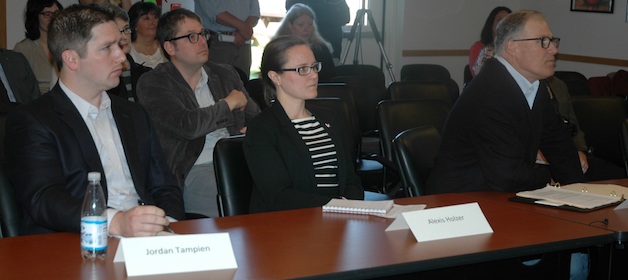ARLINGTON — Gov. Jay Inslee came away from a meeting with the Darrington-Arlington team’s presenters for the America’s Best Communities competition expressing enthusiasm for their work. He also was optimistic about their chances at the nationwide summit in North Carolina later this month.
Inslee sat on a practice panel of judges for a presentation by former Snohomish County Executive Bob Drewel, Arlington Mayor Barbara Tolbert and Darrington Mayor Dan Rankin at the Arlington Airport April 7. They delivered a preliminary version of their talking points for Durham, N.C., April 26-27.
“This was a community that was divided by the slide two years ago, but has become united in their cause,” said Inslee, who was impressed by how comprehensive the team’s economic revitalization plans were. “They address the full spectrum, from timber and recreation in the east to high-tech manufacturing in the west.”
Drewel acknowledged that the Darrington area already had been struggling in the wake of the timber industry’s decline before the 2014 Oso slide.
“The community was not sustainable on that industry alone,” Drewel said. “It needed to diversify. What this tragedy has given us is a window of opportunity for long-term economic recovery.”
The Darrington-Arlington team’s plan outlines six goals in the areas of infrastructure, industries and employment, community and workforce development, resilience and sustainability, placemaking and rural innovation.
As examples, Drewel cited the establishment of two public Wi-Fi hotspots for $8,000 as a key piece of infrastructure, while the community’s resilience and sustainability would be bolstered by $7,000 for additional data-collection equipment for the Glacier Peak Institute’s slide-monitoring efforts.
Among the plan’s examples of rural innovation, Drewel explained that $2,000 would provide local business owners with the tools to participate in tourism planning and development, while the third anniversary of the slide would be marked with a memorial bicycle ride on the 27-mile Whitehorse Trail in March of 2017 to coincide with its reopening.
“Many of these initiatives are already in progress,” Drewel said. “We’ve already hit the ground running.”
When Inslee asked the presentation team what they each thought the most important message was, Tolbert touted the connection between the Arlington and Darrington communities, while Rankin echoed Drewel by noting that they’re already moving forward on these initiatives, and will continue to do so even without ABC funds.
“You have two elected officials, and two cities, who didn’t have to invent a working relationship,” Drewel said. “They’ve operated together in the past.”
Tolbert inadvertently illustrated this point when she referred to Rankin as “Danny,” before she caught herself and promised to be more formal in North Carolina.
“We’ve been linked and bonded for a long time,” Tolbert said.
Having witnessed their work as community leaders firsthand AFTER the slide, Inslee wondered how that might be communicated to the judges, who will not be allowed to read the team’s pitch prior to its presentation.
“I’ve seen you do such amazing things, but you’re both so humble,” Inslee said.
Drewel drew laughter from the crowd by replying, “I’ll take care of that.”
Tolbert elaborated on the importance of some of the goals, holding up infrastructure such as Wi-Fi as equalizers for students and businesses alike, while workforce development programs could likewise “help keep our intellectual assets” in the community with family wage jobs.
“We’re not turning our back on our past,” Rankin said. “With timber, we’ll be applying science to foster the health of our forests and make it more sustainable.”
When Tolbert framed the prizes from ABC as seed money to spur on continued community investment, Drewel amplified his earlier statements.
“There is no quit in this community,” HE said. “We’re doing this regardless.”
Inslee forecast more natural disasters due to climate change, and suggested that Arlington and Darrington’s work serves as a national model for recovery.
“We’re ready to help make other communities ready,” Drewel said. “This proves that government can work.”







